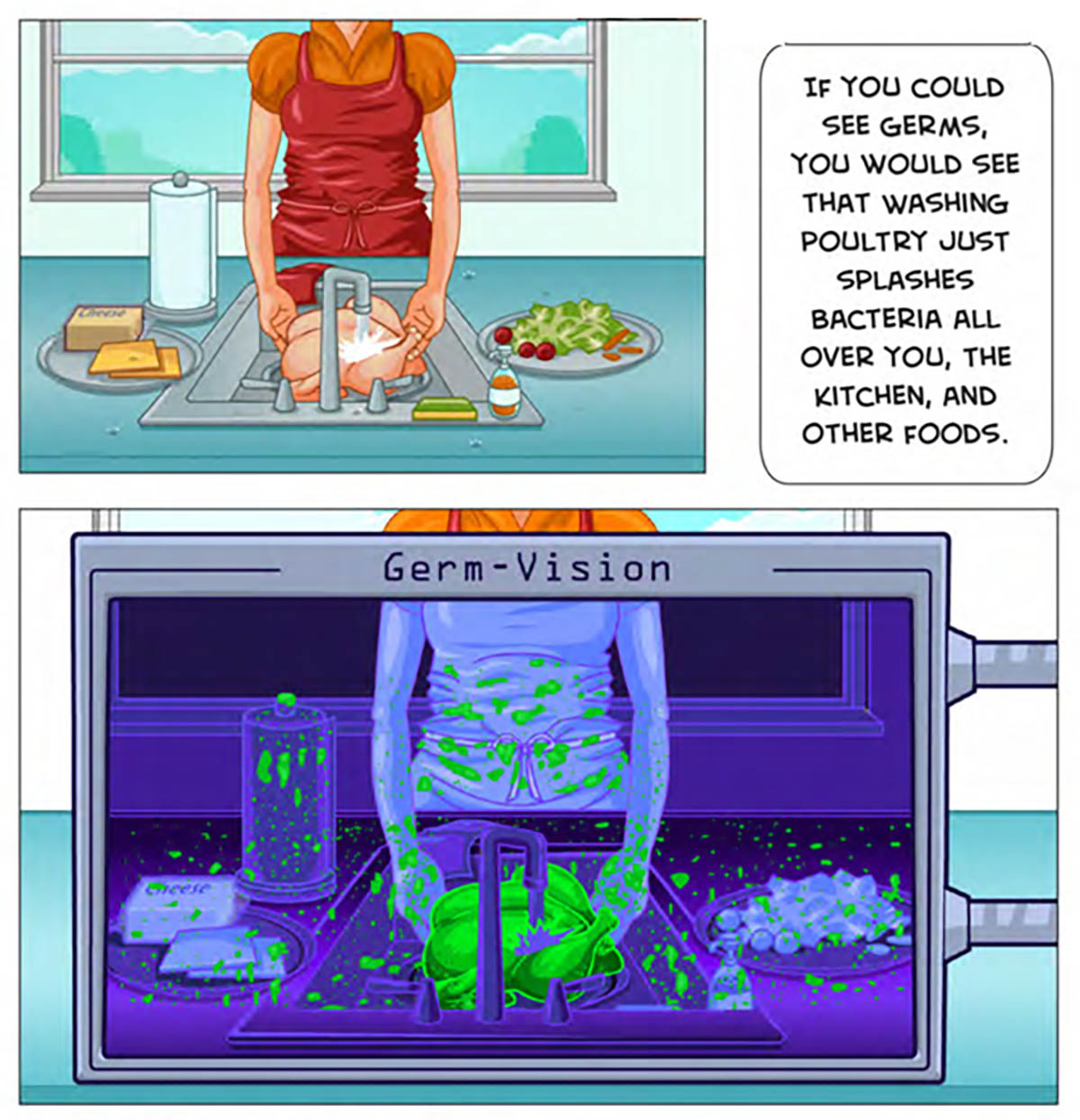"Don't Wash Your Chicken" Video Vignettes Make Cooking Safer
 By Rachel Ewing
By Rachel Ewing


“Don’t wash your chicken!” This dramatic exclamation punctuated with a sound of shattering glass punctuates each of four short video stories released by food safety researchers.
The sound signifies the shattering of the commonly held illusion that washing raw chicken prior to cooking is safe, or even prevents food-borne illness.
In fact, the opposite is true, according to food safety researcher Dr. Jennifer Quinlan, an associate professor at Drexel University, who helped develop the “Don’t Wash Your Chicken” campaign – available online at drexel.edu/dontwashyourchicken.
In each of the campaign’s mini-drama videos, a knowing family member – wife, granddaughter, daughter and mother – explains to a well-intentioned home cook that the common practice of rinsing raw poultry before cooking is actually unsafe. An animated “Germ-Vision” graphic then shows that washing chicken only risks splattering and spreading bacteria that then can cross-contaminate other foods and kitchen surfaces.
“You should assume that if you have chicken, you have either Salmonella or Campylobacter bacteria on it, if not both,” said Quinlan. These two bacteria, she noted, are the leading causes of food-borne illness. “If you wash it, you’re more likely to spray bacteria all over the kitchen and yourself.” Rinse water is not hot enough to kill bacteria anyway.
Quinlan, who is in the department of Nutrition Sciences in Drexel University’s College of Nursing and Health Professions, developed the campaign with graduate student Shauna Henley as an outgrowth of a USDA-funded research effort to identify and address unique food safety risks in racial and ethnic minority populations in the U.S. As they reported in the Journal of Food Protection, focus groups with consumers representing three different minority groups showed that washing raw poultry was a common unsafe practice in all the groups, with some minor cultural differences in the method of washing.
A subsequent larger survey showed the practice was common across the board. “It was slightly more in the minority population, but still an average of 90 percent of the population washes chicken,” Quinlan said.
When they found that few educational materials were available to inform people that washing raw chicken is unsafe, Quinlan and Henley worked with their collaborators at New Mexico State University’s Department of Media Productions to develop the “Don’t Wash Your Chicken” campaign.
They started developing stories as photo novellas – half-comic, half-photo illustrated stories, a popular format for health education materials in some minority groups. But the strengths of educational media development at New Mexico State University also included video production, so the researchers kept going and produced the stories as videos with professional actors as well. In accordance with the USDA goal of encouraging home cooking and healthy nutrition, they also developed guided recipes to accompany each story.
They used all different types of chicken for the recipes to convey that no raw poultry is safe for washing: Small pieces of cut-up chicken, chicken breasts without skin, chicken parts with skin on and whole chicken were each featured in a recipe and story. And they cast and wrote the dramas to represent multiple races and ethnicities, so almost any viewer could find them relatable.
Now the video mini-dramas, video recipe demonstrations and photo novellas with recipe cards are all available online.
Quinlan wants to spread the word about the website and the “Don’t Wash Your Chicken” message far and wide, but she expects it to be a slow conversion process before people change their behavior.
People are very attached to the idea of washing raw poultry, she noted, for a variety of reasons found in the focus group study: “Some think they’re cleaning off germs. Some just want to get slime off or feel like it’s dirty,” she said. “There are a range of reasons, including just feeling like they should do it – ‘It’s raw, I should clean it.’”
Learning that washing is actually a problem is an essential first step. Quinlan estimates that public readiness to stop washing chicken is “about where thermometer usage was about 15-20 years go.” At that time, she said, “nobody owned a thermometer or thought about using one to test doneness [of cooking meat]. Now people own a thermometer, and at least some use them.”
If the campaign is successful, one glass-shattering conversation at a time, more people should learn that it’s safest if you “don’t wash your chicken.”
For More Information
Don't Wash Your Chicken website
Ask food safety experts on BarfBlog.com. Food safety experts are ready to respond to questions and comments about washing chicken if you leave a comment here.
Discussion of the response to the campaign on the Drexel News Blog
Drexel News is produced by
University Marketing and Communications.